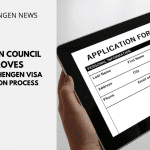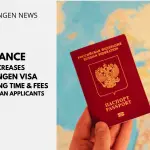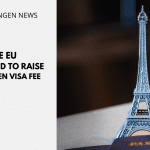EU Approved To Move Schengen Visa Application Online
The European Union has adopted a new strategy to digitalise the visa application process and eliminate the difficulties of submitting a physical Schengen visa application.
Last April 2022, the EU Commission proposed the digitalisation of the Schengen visa process, replacing the visa sticker, and introducing the ability to submit visa applications online. This would make the application for a Schengen visa a lot easier and the visa itself will be more secure and less vulnerable to theft and fraud.
On Tuesday, 31 January, the majority of the Members of the European Union Parliament (MEPs) voted in support of the plan to digitalise the Schengen visa procedures.
According to reports, 34 MEPs voted in favour of the report, five voted against it, and 20 abstained from voting.
According to the EU Parliament, digital procedures will expedite the application process, lower application costs, and effort, and advance security across all European nations.
Benefits of Online Visa Processing
Since visa requests will be handled on a single online platform, the new method will allow applicants to know the country that will receive and attend to the applications.
The technology was created to integrate with the border management systems and EU databases to mitigate security risks.
“By digitalising the visa application process for the Schengen area, the proposal aims to reduce the costs and efforts required to make an application while ensuring harmonious practises throughout Europe and improving its security,”
Statement of the EU Parliament
Romania and Bulgaria's Schengen Membership
As of 1 January 2023, Croatia became the 27th member of the Schengen area. However, Bulgaria and Romania, who had acceded to the EU six years prior to Croatia and satisfied the technical criteria to join the Schengen area as early as 2011, were denied membership.
The Schengen Area is an area of Europe with no internal border controls. Countries in the Schengen Area have agreed to abolish controls at their shared borders, allowing people to travel freely between member countries. Non-EU nationals living in or visiting the Schengen area can also travel check-free through the shared borders.
Although some Schengen members support Romania and Bulgaria in the borderless zone, Austria has opposed the bid by declaring them unprepared to secure EU borders. The Dutch government also voted against the membership of both countries citing concerns about corruption and organised crime.
Despite calls from some member states, it is unlikely that the EU will soon put Bulgaria and Romania’s Schengen membership back on the agenda.
What are your thoughts on this issue? Talk to us in the comment section below. Or if you need more advice on the above, contact us for further travel & immigration advice.
Check out the deals we have found below and tell us your travel plans.
Check out the offers and discounts from:
And because of the pandemic, don’t forget to get your travel insurance, which will cover you for flight disruptions and pandemic related matters.
IaM can help with your visa application to Europe, the United States, the UK & other countries
If you need help with a US visa, a UK Visa, or a visa to Europe, including help with appointment booking obligations, IaM can help. For more information and advice on US immigration, UK immigration law and US visa applications or if you need any help or assistance please, reach out to your Visa Coordinator at IaM.
Some of our posts include affiliate links. If you choose to purchase any of these products, we might get a small commission. For more information, check out our TOS.
- UK Aims to Attract Global Talent with Easier Visa Routes - 29 June 2025
- France Strikes Again: What Travellers Need to Know About July Flight Disruptions - 28 June 2025
- EU Reforms Hand Luggage Fees - 27 June 2025











